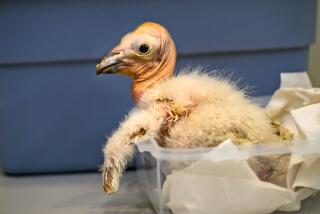Baby Boom Among Chimps Throws a Curve to Zookeepers
- Share via
A whodunit is quickly turning into a soap opera at the Los Angeles Zoo, where two more pregnant chimps have some explaining to do.
First, Yoshiko, who had been seen with male chimp Jerrard, gave birth to a baby in January. Zookeepers hadn’t even known she was pregnant. And all three male chimps of breeding age, including Jerrard, had had vasectomies.
That left retired circus chimp Toto, who reportedly has never shown an interest in sex, and Glenn, who was barely 4 at the time and considered too young to breed.
Now, more than a month later, chimpanzees Gracie and Regina are with child. Rumor has it that the same male chimp, Shaun, may have impregnated both of them. And, incidentally, Gracie and Shaun share the same father.
To combat all the wanton sex and unplanned pregnancies taking place in the zoo’s new chimp habitat, the non-pregnant, breeding-age females are going on the pill, officials announced Wednesday.
“We’re hopeful we have it licked this time,” said Dr. Cynthia Stringfield, zoo veterinarian. “But where there’s a will, there’s a way.”
Nothing surprises zoo officials anymore. The 14 chimpanzees living in a new, expansive habitat complete with grass, trees, rocks and waterfalls are an especially friendly bunch.
Toshi’s unexpected birth to Yoshiko on Jan. 31 raised zookeepers’ suspicions that others might be pregnant too.
“It wasn’t a shock,” said chimp keeper Vicki Bingaman of the latest scandal. Bingaman said Gracie, 12, had put on some weight and seemed tired. She’s due at the end of this month. However, Regina, 15, kept her secret well. She’s expected to give birth in the summer.
Although it’s hard to say without doing a paternity test, Shaun’s the prime suspect in the most recent two cases, especially Gracie’s.
“Yes, he and Gracie were quite the couple,” said Bingaman, between laughs. “She really, really liked Shaun.”
Zoo officials are hoping the administration of birth control pills to the non-pregnant breeding females will end the baby boom.
They first tried the pill (the same kind women take) in 1991, after officials from the American Zoo and Aquarium Assn.’s Species Survival Plan asked the zoo to stop breeding chimps who already were well-represented in the gene pool.
But that first effort proved problematic. At the time, the chimps were housed in a small facility, one-quarter the size of the current habitat. When Bingaman tried to administer a pill, usually mashed up in a banana, the dominant males would take it, or a mother chimp would give it to her child.
So zookeepers tried hormonal implants, which failed and resulted in four births. Vasectomies came next, but their effectiveness is now suspect.
With a larger habitat and two chimp keepers assisting her, Bingaman said she has successfully fed the pills, mashed up in yogurt, to the four non-pregnant breeding females since Feb. 21.
Paternity tests for Toshi and the two pending baby chimps will not be done for a while, officials said. Hair samples need to be taken from the baby and the mother for DNA comparison, but chimp keepers would rather not disturb Toshi, who is still clinging to her mother, right now.
Although zoo officials were a little upset when they heard the chimps had defied them yet again, Bingaman sighed, “But they’re precious. How can you not love ‘em?”
More to Read
Sign up for Essential California
The most important California stories and recommendations in your inbox every morning.
You may occasionally receive promotional content from the Los Angeles Times.













